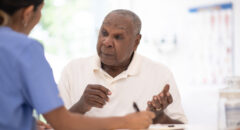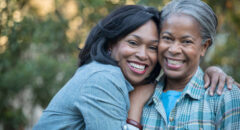 If the image that pops into your head when you hear the words “eating disorder” is a white teenage girl obsessed with her looks, you don’t even know half the story. Eating disorders don’t discriminate, they aren’t exclusively for girls and they definitely aren’t about “looking better.” They’re real, and deadly, mental illnesses, and those who suffer from them desperately need our support and understanding.
If the image that pops into your head when you hear the words “eating disorder” is a white teenage girl obsessed with her looks, you don’t even know half the story. Eating disorders don’t discriminate, they aren’t exclusively for girls and they definitely aren’t about “looking better.” They’re real, and deadly, mental illnesses, and those who suffer from them desperately need our support and understanding.
READ: How to Help Your Loved One Recover From An Eating Disorder
To further crush some stereotypes, we asked people in the National Eating Disorder Association’s (NEDA) community to tell us one myth about eating disorders they want to see busted.
Here’s what they had to say:
Myth #1: You have to be “sickly thin” to have an eating disorder.
An eating disorder is actually defined by “extreme emotions, attitudes and behaviors surrounding weight and food” — not by pounds lost. “Most people will probably be surprised or even skeptical to hear that a kid struggling with obesity can also be anorexic,” former president of NEDA, Lynn Grefe, told Today.
“Having an eating disorder is serious. Just because I look ‘normal’ does not mean I’m OK.”
Myth #2: It’s just like a really strict diet.
Having an eating disorder isn’t a version of an extreme diet. While you have control over a diet, an eating disorder can control you. There are no cheat days when you have an eating disorder.
“People think having an eating disorder just means you want to get skinny. When I tell people about my eating disorder, they’ll ask, ‘But why? You didn’t need to lose weight!’ An eating disorder is not a diet fad — it’s a mental illness!”
Myth #3: Recovery is as simple as “just eating.”
Those with eating disorders need professional help that goes beyond repairing their relationship with food. According to the NEDA, “The most effective and long-lasting treatment for an eating disorder is some form of psychotherapy or counseling, coupled with careful attention to medical and nutritional needs.”
“Whenever someone told me just to stop restricting and eat normally, I would just roll my eyes and say, ‘If it was that simple, I’d be ‘better’ by now.’”








